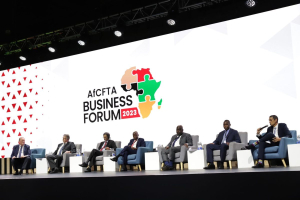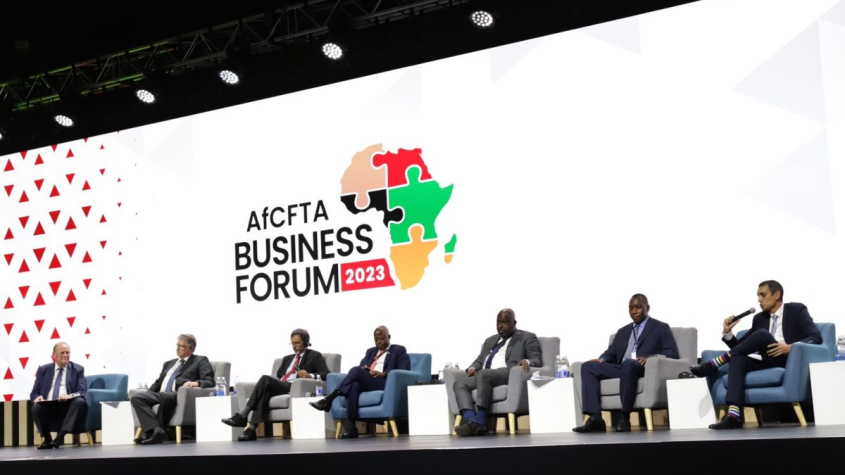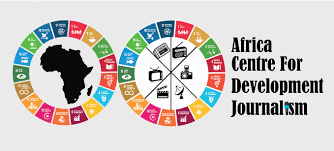AfCFTA Business Forum: Promoting a private sector-friendly environment for AfCFTA’s implementation
The African Continental Free Trade Area (AfCFTA) Secretariat, in partnership with the Republic of South Africa, hosted the inaugural AfCFTA Business Forum, a platform for creating awareness on the business and investment opportunities created by the AfCFTA market for intra-Africa trade.

The AfCFTA Business Forum (ABF), which seeks to become Africa’s biggest business event, is designed to accelerate the implementation of the AfCFTA by promoting trade and investment across Africa. Thus, the Forum provides a unique platform for promoting a private sector-friendly environment for the implementation of the landmark agreement aimed at creating the envisioned single African market. The Forum which was held in Cape Town, South Africa from April 16th to 19th, was themed: “Acceleration of implementation of AfCFTA” .
To this end, the 2023 ABF featured conversations across priority sectors and value chains, namely agro-processing, automotive, pharmaceuticals, transportation and logistics as well as digital trade. It sought to create awareness on the business and investment opportunities created by the AfCFTA market for Africa’s business community; connected businesses to funding opportunities across AfCFTA value chains as well as promoting a friendly business environment for women and youth-led MSMEs.
The Forum took place barely six months after the launch of the AfCFTA’s Guided Trade Initiative (GTI), which came into being after the creation of all necessary measures and instruments for the commencement of trading under the Agreement, namely the AfCFTA e-Tariff Book, the Rules of Origin (ROO), the AfCFTA Adjustment Fund as well as the Pan-African Payments and Settlement System (PAPSS).
Among others, the ABF offered spaces for B2B meetings, deal rooms as well as investment, cultural and social events. Thus, the Forum offered a platform for businesses and investors to pitch their ideas and projects to a panel of potential investors and business leaders, thereby offering companies and entrepreneurs a unique platform to showcase their innovative projects and attract investments, partnerships, and mentorships.
In his opening remarks, AfCFTA Secretary General Wamkele Mene said the AfCFTA Agreement which had thus far been ratified by 47 out of 55 AU Member States would address the over 60-year fragmentation of African national economies, colonial trade patterns, lack of industrial capacity as well as Africa’s overreliance on the export of primary unprocessed commodities. These factors, he said, were responsible for the low-level of intra-African trade and Africa’s lowly contribution to global GDP.
“In order for us to see the results that we all desire to see, the private sector has to play a critical role in the implementation of the AfCFTA. Africa’s private sector is estimated to account for about 80% of total production, 67% of investment and employs 90% of the working-age population. As I have noted before, governments do not trade, the AfCFTA Secretariat does not trade, it is the private sector that drives trade,” Mr Mene stressed.
The AfCFTA chief cited a study by McKinsey & Company and the Brookings Institution which estimates that annual spending by African consumers and businesses will reach $6.66 trillion by 2030 – upward from $4 trillion in 2015 – noting that this trend was spurring growing markets in various sectors where the continent has unmet needs such as agriculture and agro-processing, pharmaceuticals, automotives as well as transport and logistics.
“As an outcome of this trade dialogue, we intend to establish an ongoing platform for the private sector to be one of the pillars of implementation of the AfCFTA, so that we can jointly identify opportunities for investment in value chains that will increase intra-African trade. We must leverage the vast opportunities that persist in the various critical sectors of our economies to place the continent on a path of long-term industrial development,” the AfCFTA secretary general assured.
In his keynote address, Mahamadou Issoufou, former president of the Republic of Niger cum AfCFTA Champion, said outcomes of the AfCFTA-GTI launched in October 2022 with seven State Parties provided information on the readiness and effectiveness of national and institutional systems in the participating countries as well as the effectiveness of AfCFTA’s legal instruments, demonstrating the continent was on the right track to achieving the objectives of the AfCFTA.
“Given the positive results achieved in this first phase of guided trade, preparations are underway for the launch of the second phase of the Initiative [GTI] in June of this year, with a larger number of state parties and an expansion to include trade in services. I call on the private sector and the business communities of all African countries present here today to demonstrate more commitment,” urged President Issoufou.
The AfCFTA Champion said while trade agreements were negotiated by governments, the private sector is the primary beneficiary and implementer of trade agreements, describing the ABF as an appropriate platform for policymakers, business and industry leaders, private sector stakeholders and investors to lay and consolidate the foundations for meaningful intra-African trade as well as stimulate intra-Africa investment.
“The AfCFTA was designed for the business community, in particular for the African private sector, which must seize the new opportunities it offers and turn them into concrete actions. It is the ideal way for Africa to do business with Africa and to have a greater impact on international trade. This will require creating the conditions for our competitiveness through the adoption and implementation of smart trade strategies,” he stated.
To this end, President Issoufou said the private sector must play an active role in the formulation of AfCFTA’s national and regional implementation strategies. “It is through these strategies, including those defined by the private sector, that the benefits and gains of the AfCFTA will be transformed into real structural changes for Africa. This is essential to ensure the AfCFTA effectively contributes to the emergence of national, regional, and continental value chains for sustainable and inclusive development.”
Ms Monique Nsanzabaganwa, deputy chairperson of the AU Commission believes the adoption of “Year of AfCFTA: Acceleration of the African Continental Free Trade Area Implementation” as the AU theme for 2023 would generate greater political momentum, just as the AfCFTA Business Forum had become one of the flagship events contributing to the acceleration of effective implementation of the AfCFTA.
“As the implementation of the AfCFTA Agreement gathers momentum, it is important to allow the pan-African business community to take ownership of this flagship project. The AU Commission, the AfCFTA Secretariat, Member States, Regional Economic Communities, Development Partners have delivered on this flagship project of Agenda 2063. It is now up to the private sector to start trading. Governments will not trade with each other under the AfCFTA, it is the private sector [that will trade]!”
Recently, Nsanzabaganwa said there had been incessant requests for business partnerships with Africa from the USA, EU, India, China, and South America and therefore encouraged the African private sector to take advantage of these opportunities. “It is from those alliances that we incubate ideas for Continent-to-Continent Free Trade. Unlike in the 1970s, in this technological era, businesses lead government policy decisions. Hence, I encourage you to own the African business space.”
Nonetheless, the AU scribe said as the continent adopts the AfCFTA it was pertinent to ensure the inclusion of women-and youth-owned businesses and SMEs, noting that for decades, Africa’s business community has been led and dominated by big conglomerates, while the dynamic potential and contribution of SMEs (which account for around 80 percent of the region’s businesses) is overlooked for which reason they continue to struggle to penetrate markets.
“I therefore encourage women and youth-led SMEs in attendance at this AfCFTA Business Forum to position themselves in such a way that you identify and seize market opportunities and expand business networks, while I further urge all in attendance to move forward with the intention of the integration of our African women and youth-led SMEs into regional/continental value chains,” she urged.
Nardos Bekele-Thomas, CEO of the AU Development Agency (AUDA-NEPAD), said since the establishment of the Organisation for African Unity (OAU) in 1963, economic integration had remained a key driver of continental growth and development initiatives such as the Lagos Plan of Action, the Abuja Treaty. Yet, she said Africa had failed to translate these lofty policies into increasing intra-African trade, which remains at unacceptably 16% while trade with the rest of the world is at 84%.
Thus, Bekele-Thomas said Africa’s private sector had a critical role to play in boosting intra-African trade by unlocking the potential of the AFCFTA. To this end, she said it was vital to create an enabling environment for businesses to thrive, noting that the current state of private sector development in Africa leaves much to be desired due to lack of access to finance, poor infrastructure, and high cost of doing business, among other teething challenges.
“We need to improve access to finance, especially for small and medium-sized enterprises. We need to invest in infrastructure, including energy, transport, and ICT, to reduce the cost of doing business. We need to promote regional value chains and the development of local industries to increase intra-regional trade. In particular, the manufacturing sector represents the single greatest opportunity to unlock the power of the AFCFTA for Africa and stimulate employment creation,” she said.
Likewise, Bekele-Thomas said the Fourth Industrial Revolution (4IR) was transforming global value chains, including the manufacturing sector, thanks to the introduction of robotics, Artificial Intelligence, among other advanced technologies, which have created a new era of manufacturing competitiveness. Therefore, to be globally competitive in this new era, Africa’s manufacturing sector must invest in developing 4IR capacities, i.e invest in robotics and AI as well as integrating them into the manufacturing process.














